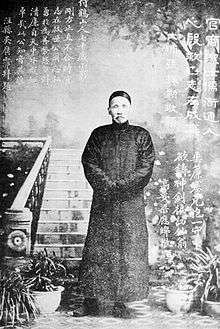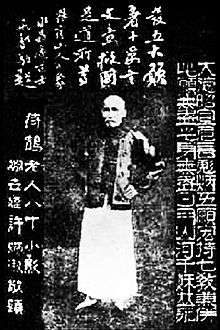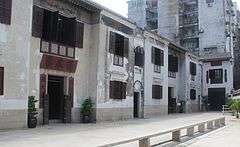Zheng Guanying
| Zheng Guanying | |||||||||
| Traditional Chinese | 鄭觀應 | ||||||||
|---|---|---|---|---|---|---|---|---|---|
| Simplified Chinese | 郑观应 | ||||||||
| |||||||||
| Zheng Guanying | |
|---|---|
 | |
| Native name | 鄭觀應 |
| Born | July 24, 1842 |
| Died | 1922 |
| Nationality |
|
| Occupation |
Merchant reformer author |
| Known for |
Chinese nationalist republican advocate |

Zheng Guanying or Cheng Kuan-ying (1842-1922 or 1923) was a Chinese reformist active in the late Qing Dynasty.[1] He was a proponent of fighting economic dominance by Western countries of China[2] through economic nationalism, of parliamentary representative democracy, and of women's rights.[3]

History
His family members resided in Macau,[4] but his birthplace was Xiangshan, Guangdong;[1] today this is the Yongmo area of Sanxiang, Zhongshan. He lived in the Mandarin's House in São Lourenço, Macau.[4]
He made a career as a comprador after moving to Shanghai at 16 years of age;[1] he previously took and failed the xiucai imperial examinations at that age;[5] he ultimately never passed any such examinations.[1] He first worked for Overweg and Company, a British firm,[5] and later for Butterfield & Swire.[1] Initially he used his funds to buy official titles. In 1879 he became a circuit intendant or daotai as an award for his community service, and he received other titles due to his service work.[6] He took night classes on the English language at the Anglo-Chinese School.[1] He began his own firm after turning 41.[1] He went back to Macau in late 1886.[4]
His employment background differed from those of other Chinese reformers of that era;[1] others had academic or government backgrounds.[3]
Works
In the early 1870s he published essays about politics.[6]
Words of Warning to a Prosperous Age (盛世危言 shèngshì wēiyán) was published in 1893.[6]
Travels to the South, a travel log, was the result of his 1884 intelligence-gathering mission in French Indochina.[1]
Legacy and scholarship
Zheng's writings had an extraordinary influence, both in his own time and in later decades. Among those who acknowledge his inspiration were Mao Zedong,[7] and Lu Xun .[6]
As of 2011 most English-language journal articles discussing Zheng were published in the 1960s, and few English-language books on him existed. Beginning in the 1980s more articles about Zheng were published in Chinese.[8]
Escola Oficial Zheng Guanying, a government school in Macau, was given its current name in 2011.[9] The 160h anniversary of the birth of Zheng was held in Zhongshan in 2002.[8]
References
- Guo, Wu. Zheng Guanying, Merchant Reformer of Late Qing China and his Influence on Economics, Politics, and Society. Cambria Press. May 28, 2010. ISBN 9781604977059.
Notes
- 1 2 3 4 5 6 7 8 9 "Zheng Guanying 1842-1922/3." Chinese University of Hong Kong. Retrieved on 12 November 2017.
- ↑ "Zheng Guanying, Merchant Reformer of Late Qing China and his Influence on Economics, Politics, and Society by Guo Wu ." Cambria Press. Retrieved on 12 November 2017.
- 1 2 Guo, Wu, p. 2.
- 1 2 3 "Zheng Guanying." Mandarin's House, Cultural Affairs Bureau (Macau). Retrieved on 12 November 2017.
- 1 2 Guo, Wu, p. 1.
- 1 2 3 4 Davies, Gloria (Monash University). "Fragile Prosperity." China Heritage Quarterly. No. 26, June 2011. Retrieved on 12 November 2017.
- ↑ Pantsov, Alexander V.; Levine, Steven I. (2012). Mao: The Real Story. New York and London: Simon & Schuster. ISBN 978-1-4516-5447-9. , p. 21
- 1 2 Guo, Wu, p. 3.
- ↑ "Escola Zheng Guanying nega acusações de pais". Jornal Tribuna de Macau. 2016-03-18. Retrieved 2017-08-15. "Confrontada com a polémica da mudança dos directores, Wu Kit disse que desde a transformação da Escola Luso-Chinesa de Tamagnini Barbosa para a Escola Zheng Guanying em 2011,[...]"
Further reading
English:
- Chong, Key Ray. "Cheng Kuan-ying (1841–1920): A Source of Sun Yat-sen's Nationalist Ideology?" The Journal of Asian Studies. Association for Asian Studies, Volume 28, Issue 2. February 1969, pp. 247–267. Published online 1 March 2011. DOI: 10.2307/2943001. JSTOR: 2943001.
- Hao, Yen-P'ing. "Cheng Kuan-ying: The Comprador as Reformer." The Journal of Asian Studies. Association for Asian Studies, Vol. 29, No. 1 (Nov., 1969), pp. 15–22. JSTOR 2942519.
Chinese:
- Xia, Dongyuan. Zheng Guanying Ji Shang Ce. (Collected works by Zheng Guanying, Volume 1). Shanghai Renmin Chubanshe, Shanghai 1982.
- Xia, Dongyuan. Zheng Guanying Ji Xia Ce. (Collected works by Zheng Guanying, Volume 2). Shanghai Renmin Chubanshe, Shanghai 1982.
- Fung, Yiu-shing (馮耀成) (1998). "Zheng Guanying's (1841-1923) ideas of parliamentary reform as expounded in his Shengshi Weiyan = Zheng Guanying "Sheng shi wei yan" zhong de yi yuan gai ge si xiang" (鄭觀應«盛世危言»中的議院改革思想) (Master's thesis). University of Hong Kong. DOI 10.5353/th_b3195197. English abstract available.
- Ha, Chi-kwan (夏志焜) (1999). "Zheng Guanying's (1842-1922) ideas of political reform = Zheng Guanying zheng zhi gai ge si xiang yan jiu" (鄭觀應政治改革思想硏究) (Master's thesis). University of Hong Kong. DOI: 10.5353/th_b3195199. English abstract available.
- Kwong, Ming-wai (鄺明威) (2007). "Daoist influence on Zheng Guanying's (1842-1922) thought = Zheng Guanying de dao jiao qing xiang yu ji shi si xiang yan jiu" (鄭觀應的道教傾向與濟世思想研究) (Master's thesis). University of Hong Kong. DOI 10.5353/th_b3859870. English abstract available.
- Siu, Men-yee Anita (蕭敏儀) (1989). "A study of Zheng Guanying's (1842-1922) economic thought = Zheng Guanying de jing ji si xiang yan jiu" (鄭觀應的經濟思想硏究) (Master's thesis). University of Hong Kong. DOI: 10.5353/th_b3194967. At the University of Hong Kong Libraries Electronic Resources Alumni e-Library. English abstract available.
- Wang, Ying-k'ang. "Cheng Kuan-ying ch'i-jen chi chʻi ssu-hsiang" ("The Profile and Ideas of Cheng Kuan-ying"). Shih-hsüeh yüeh-kan ("Monthly Historical Study"), formerly Hsin shih-hsüeh t'ung-hsün ("Thorough Investigation of New Historical Study"). Volume 1 (January, 1958), Issue 34.
German:
- Kehnen, Johannes. Cheng Kuan-Ying – Unternehmer und Reformer der späten Ch'ing-Zeit. Verlag Otto Harrassowitz, Wiesbaden 1975, ISBN 3-447-01716-3.
External links
